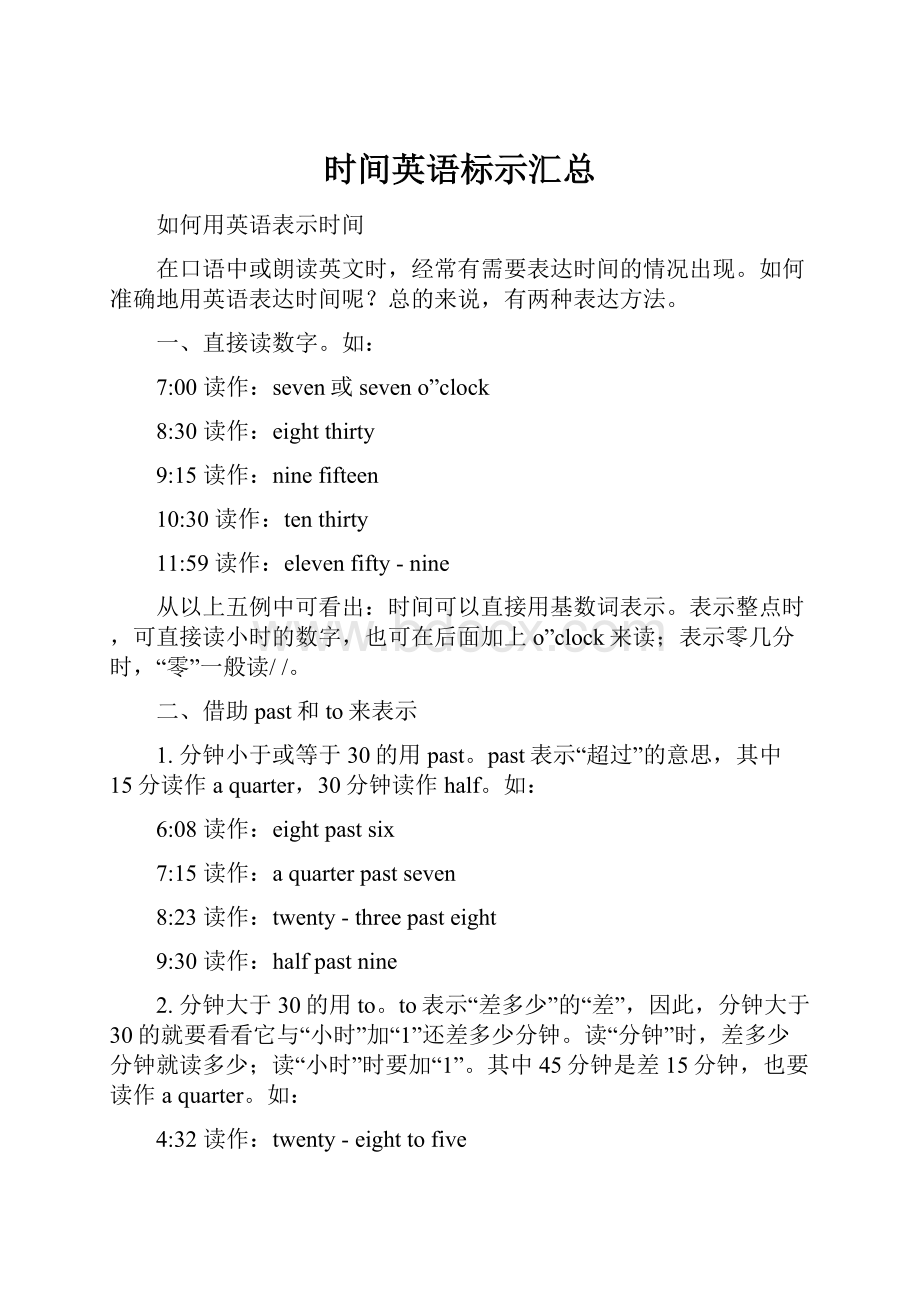时间英语标示汇总.docx
《时间英语标示汇总.docx》由会员分享,可在线阅读,更多相关《时间英语标示汇总.docx(10页珍藏版)》请在冰豆网上搜索。

时间英语标示汇总
如何用英语表示时间
在口语中或朗读英文时,经常有需要表达时间的情况出现。
如何准确地用英语表达时间呢?
总的来说,有两种表达方法。
一、直接读数字。
如:
7:
00读作:
seven或seveno”clock
8:
30读作:
eightthirty
9:
15读作:
ninefifteen
10:
30读作:
tenthirty
11:
59读作:
elevenfifty-nine
从以上五例中可看出:
时间可以直接用基数词表示。
表示整点时,可直接读小时的数字,也可在后面加上o”clock来读;表示零几分时,“零”一般读//。
二、借助past和to来表示
1.分钟小于或等于30的用past。
past表示“超过”的意思,其中15分读作aquarter,30分钟读作half。
如:
6:
08读作:
eightpastsix
7:
15读作:
aquarterpastseven
8:
23读作:
twenty-threepasteight
9:
30读作:
halfpastnine
2.分钟大于30的用to。
to表示“差多少”的“差”,因此,分钟大于30的就要看看它与“小时”加“1”还差多少分钟。
读“分钟”时,差多少分钟就读多少;读“小时”时要加“1”。
其中45分钟是差15分钟,也要读作aquarter。
如:
4:
32读作:
twenty-eighttofive
6:
45读作:
aquartertoseven
11:
58读作:
twototwelve
12:
49读作:
eleventoone(12小时制)
eleventothirteen(24小时制)
归纳以上借助past和to表达时间的方法,可以编如下的顺口溜记忆其规律:
30分以内,分在前,点在后,past在中间;
30分以外,分用60减,点要加上1,用to来连接。
直接表示时间法:
就是按照几点几分的顺序来表示时间。
(这个最简单)例如:
8:
00——eight(o’clock)?
?
?
?
?
?
5:
20——fivetwenty
2添加介词表示法
如果分数小于或等于30,就用past来表示,结构是“分钟+past+该点钟“;如果分钟大于30,就用to来表示,结构是“分钟+to+下一点钟
例如:
12:
05——fivepasttwelve
9:
50——tentoten
8:
40——twentytonine
温馨提示:
在第二种表示法中,如果分钟是15,一般用aquarter来代替fifteen;如果分钟是30,一般用half来代替thirty。
例如:
9:
15——aquarterpastnine
11:
30——halfpasteleven
2:
45——aquartertothree
下面给大家提出一些例句,都是用来表示时间的.其中既提供了很多种不同的提问时间的方法,也举出了很多对于不同时间的灵活多变的回答.大家可以在实际应用中模仿着造句.
Whattimeisit,Gordon?
几点了,戈登?
Justafterfive.刚过5点。
What'sthetimenow?
现在是什么时刻?
It'squarterpast.一刻了。
Canyoutellmethetime?
你能告诉我几点了吗?
It'stwenty-fivepasttwelve.12点25分。
Haveyougotthetime?
你知道现在是什么时间吗?
Itisnearlyoneo'clock.快一点了。
WhattimedoestheboatleavefromNewYork?
船什么时间离开纽约?
Ataquarterpastthreeintheafternoon.下午3点15分。
Thetimeissixforty-five.现在是6点45分。
Mywatchsayssixthirty.我的表是6点30分。
It'sfivetoeightandbreakfast'sateighto'clock.现在差5分8点B,早餐八点钟开。
Thetimewas10:
35hoursGreenwichMeanTime.现在是格林威治平时10点35分。
I'llbebackatquarterpastone.我1点15分回来。
Byeleveno'clockBrianwasbackinhisoffice.布赖恩11点回到了办公室。
Attwoo'clockinthemorningcaslonwasstillawake.到凌晨2点卡斯隆还没睡着。
Youshouldbetherenolaterthanninethirty.你必须在9点半前到那儿。
Officehoursarefrom9a.mto6p.m办公时间为早9点到下午6点。
时间表达方法
4:
00fouro'clock
four
4o'clock
04:
00fourinthemorning
4a.m
16:
00fourintheafternoon
4p.m
9:
00nineo'clock
nine
9o'clock
09:
00nineinthemorning
9a.m
21:
00nineintheevening
nineatnight
9p.m
12:
00twelveo'clock
twelve
12o'clock
12:
00twelveinthemorning,
12a.m
midday
00:
00twelveatnight
12p.m
midnight
12:
15,00:
15aquarterpasttwelve
quarterpasttwelve
twelvefifteen
aquarteraftertwelve
02:
25,14:
25twenty-fivepasttwo
twenty-fiveminutespasttwo
twotwenty-five
twenty-fiveaftertwo
11:
30,23:
30halfpasteleven
eleven-thirty
halfeleven
halfaftereleven
12:
45,00:
45aquartertoone
quartertoone
twelveforty-five
07:
50,19:
50tentoeight
tenminutestoeight
sevenfifty
月份/星期英语简写
一月JanuaryJan.
二月FebruaryFeb.
三月MarchMar.
四月AprilApr.
五月MayMay
六月JuneJun.
七月JulyJul.
八月AugustAug.
九月SeptemberSep.
十月OctoberOct.
十一月NovemberNov.
十二月DecemberDec.
星期一MondayMon.
星期二TuesdayTue.
星期三WednesdayWed.
星期四ThursdayThu.
星期五FridayFri.
星期六SaturdaySat.
星期日SundaySun.
日期的表达例句:
1.What'tthedatetoday?
It'sJuly2,2003.
今天是几号?
今天是2003年7月2号。
2.LabourwasdefeatedintheGeneralElectionon19thJune1970.
工党在1970年6月19日大选中败北。
3.TheymarriedonDecember9,1913.
他们于1913年12月9日结婚。
4.It'sMondaythefifthofApril.
4月15日星期一。
5.ThecasewasheardintheHighCourtinFebruary1970.
这个案件于1970年2月由高等法院审理。
6.WherewereyouonthenightsofFebruary4thand7th?
2月4日和7日晚上你都在什么地方?
7.TheylivedtoghtherfromDecemberofthatyearuntilJuneof1980.
他们从那年12月到1980年6月一直住在一起。
8.Thepaperhehandsmehasa1975date.
他签发给我文件写的是1975年的日期。
表达星期几的例句
1.Whatdayistoday?
TodayisTuesday,Maythethirteenth.
今天星期几?
今天是5月13日星期二。
2.everyTuesdayforthenextfewmonths
下几个月的每星期二
3.I'mterriblebusyonSaturdays.
我在星期六特别忙。
4.OnMondaynights,thepupilsgotothecinema.
星期一的晚上,学生们去看电影。
5.I'veneverworkedonaSundayinmywholelife.
我从未在星期日工作过。
1840年eighteenforty
1900年nineteenhundred
1992年nineteenninety-two
2000年twentyhundred
2003年twentyzerothree
注意:
年份一般用基数词表示,写时可以用阿拉伯数字。
读时一般先读前两位,再读后两位;整百的年份一般以hundred为单位。
例如:
1840年读为eighteenforty,象1900年、2000年直接以hundred为单位。
年代表示方法:
八十年代eighties指的是1980-1989,可写为1980's,
另外1980-1985可写为earlyeighties,1985-1989可写为lateeighties。
例如:
1.inStockholminthethirties
三十年代在斯德哥尔摩
2.Iwentonacomputertrainingcourseinthenineteeneighties.
我在八十年代进过计算机培训班。
在英式英语中,日期在前月份在后,即顺序为日月年,但在美式英语中,则月份在前日期在后,即顺序为月日年。
这一点必须注意,否则会发生错误。
例如:
10-7-86或10/7/86,在英式英语中是表示July10th1986(1986年7月10日),而在美式英语中,则表示October7th1986(1986年10月7日)。
我们使用的计算机上的时间就是美式英语。
英美说法不同的还有,例如:
这事发生在星期四。
在英式英语中IthappenedonThursday.而在美式英语中为IthappenedThursday.
通常用英文表示年份日期时,
采用月+日+年的形式,
比方2003年6月10日,就是June(6月)+thetenth(10日)+twothousandthree(2003年).
如:
2005可以读为本TWOTHOUSANDANDFIVE或者TWOOOFIVE(O读为字母的音)
值得注意的是,在讲到日期的时候,通常用序数词,如用first,second,third之类的
至于时间表示的就可分别上午和下午,
1:
00a.m.指的是凌晨1点,而1:
00p.m.指下午1点,及13:
00
差几分到几点的如2点差2分,可表示为twototwo,
几点几分的如2:
30,可以说thirtypasttwo或者halfpasttwo,
由此可以推出时间的正确表达法。
时间时刻的英语表示法
1.表示几点钟用基数词加可以省略的o’clock
5:
00读作fiveo’clock或five
2.表示几点过几分,在分钟后加past,再加小时
fivepastseven七点过五分
halfpastsix六点半
aquarterpasteight八点过一刻
sevenpasteight八点过七分
3.表示几点差几分,在分钟后面加to,再加小时
tentoeight差十分八点(七点五十分)
aquartertotwelve差一刻十二点(十一点四十五分)
twentytosix差二十分六点(五点四十分)
在日常生活中,常用下列简单方法表示时间。
以小时、分种为单位分别读出数字。
6:
31 读作sixthirty-one
10:
26读作tentwenty-six
14:
03读作fourteenothree
16:
15读作sixteenfifteen
18:
30读作eighteenthirty
23:
55读作twenty-threefifty-five
注:
时刻表上的时间大多采用24小时表示法,这样就不需要用a.m.表示上午,p.m.表示下午了。
年月日英语表示法
1.世纪可以用定冠词加序数词加世纪century表示,也可以用定冠词加百位进数加’s表示
thesixth(6th)century公元六世纪
theeighteenth(18th)century公元十八世纪
the1900’s二十世纪
the1600’s十七世纪
这里,用百位数整数表示的世纪比这一百位阿拉伯数字本身多一个世纪。
2.年代用定冠词及基数词表示的世纪加十位整数的复数形式构成
inthe1930’s(inthethirtiesofthetwentiethcentury或inthenineteenthirties)
在二十世纪三十年代
inthe1860’s(inthesixtiesofthe19thcentury或intheeighteensixties)
在十九世纪六十年代
Inthe1870’swhenMarxwasalreadyinhisfifties,hefounditimportanttostudythesituationinRussia,sohebegantolearnRussian.
在十九世纪七十年代当马克思已经五十多岁时,他发现研究俄国的形势很重要,便开始学习俄语。
3.表示某年代的早期、中期和晚期,可以在定冠词后,年代前添加early,mid-,late
intheearly1920’s在二十世纪二十年代早期
inthemid-1950’s在二十世纪五十年代中期
4.年月日表示法
A.年份用基数词表示,一般写为阿拉伯数字,读时可以以hundred为单位,也可以以世纪、年代为单位分别来读。
1949读作nineteenhundredandforty-nine或nineteenforty-nine
1800读作eighteenhundred
253读作twohundredandfifty-three或twofifty-three
1902读作nineteenhundredandtwo或nineteenotwo
表示在哪一年,一般在年数前加介词in,使用year时,year放在数词之前。
intheyeartwofifty-threeB.C.在公元前253年
但是,通常采用in加表示年份的阿拉伯数字。
B.月份,在哪个月用介词in加第一个字母大写的月份词表示。
例如:
inMay在五月;inJuly在七月。
为了简便起见,月份与日期连用时,月份常用缩写形式表示。
缩写形式除May,June,July外,其它的月份都由其前三个字母表示,但September除外。
January——Jan.一月February——Feb.二月
March——Mar.三月April——Apr.四月
August——Aug.八月
September——Sept.九月
October——Oct.十月
November——Nov.十一月
December——Dec.十二月
注:
这里缩写形式后面加点不能省略,因为它是表示缩写形式的符号。
C.日期用定冠词the加序数词表示。
在哪一天要添加介词on。
NationalDayisonOct.1.
国庆节是十月一日。
(读作Octoberfirst)
此句也可以表示为NationalDayisonthe1stofOctober.
May5五月五日(读作Mayfifth)
也可以表示为thefifth(5th)ofMay
Mar.1(st)三月一日(读作Marchfirst或thefirstofMarch)
5.表示不具体、不确切的时间,如世纪、年代、年份、月份时,用介词in表示,表示具体确切的某一天用介词on表示通常情况下morning,afternoon,evening等词前用介词in。
但是,当这些词前后有一修饰限定的词作为定语,把它们限定为某一天早晨、下午或晚上时,介词in应改为on。
这里的修饰限定词可以是介词短语、名词、形容词、定语从句等。
Onacoldmorning,theoldmandiedlonelyinhishouse.
在一个寒冷的早晨,这个老人孤独地死在自己的房子里。
Idon’twanttobedisturbedonnightswhenIhavetostudy.
我不愿意在我必须学习的晚上被打扰。
TheaccidenthappenedontheafternoonofJuly7.
这次事故发生在7月7日下午。
WearetohaveasmalltestonMondaymorning.
星期一早晨我们将进行一次小测验。